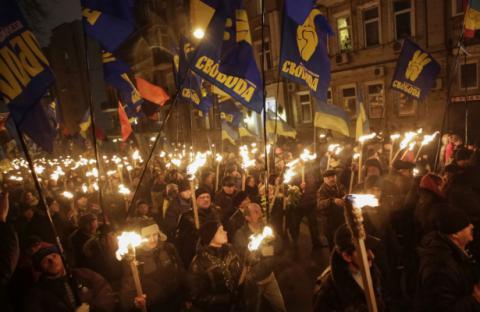For weeks, the US-backed regime in Kiev has been committing atrocities against its own citizens in southeastern Ukraine, regions heavily populated by Russian-speaking Ukrainians and ethnic Russians. While victimizing a growing number of innocent people, including children, and degrading America’s reputation, these military assaults on cities, captured on video, are generating pressure in Russia on President Vladimir Putin to “save our compatriots.”
The reaction of the Obama administration—as well as the new cold-war hawks in Congress and in the establishment media—has been twofold: silence interrupted only by occasional statements excusing and thus encouraging more atrocities by Kiev. Very few Americans (notably, the independent scholar Gordon Hahn) have protested this shameful complicity. We may honorably disagree about the causes and resolution of the Ukrainian crisis, the worst US-Russian confrontation in decades, but not about deeds that are rising to the level of war crimes, if they have not already done so.
* * *
In mid-April, the new Kiev government, predominantly western Ukrainian in composition and outlook, declared an “anti-terrorist operation” against a growing political rebellion in the Southeast. At that time, the rebels were mostly mimicking the initial Maidan protests in Kiev in 2013—demonstrating, issuing defiant proclamations, occupying public buildings and erecting defensive barricades—before Maidan turned ragingly violent and, in February, overthrew Ukraine’s corrupt but legitimately elected president, Viktor Yanukovych. (The entire Maidan episode, it will be recalled, had Washington’s enthusiastic political, and perhaps more tangible, support.) Indeed, the precedent for seizing official buildings and demanding the allegiance of local authorities had been set even earlier, in January, in western Ukraine—by pro-Maidan, anti-Yanukovych protesters, some declaring “independence” from his government.
Considering those preceding events, but above all the country’s profound historical divisions, particularly between its western and eastern regions—ethnic, linguistic, religious, cultural, economic and political—the rebellion in the southeast, centered in the industrial Donbass, was not surprising. Nor were its protests against the unconstitutional way (in effect, a coup) the new government had come to power, the southeast’s sudden loss of effective political representation in the capital and the real prospect of official discrimination. But by declaring an “anti-terrorist operation” against the new protesters, Kiev signaled its intention to “destroy” them, not negotiate with them.
Read more here
Copyright c 2014 The Nation. Reprinted with permission. May not be reprinted without permission. Distributed by Agence Global.


Spread the word